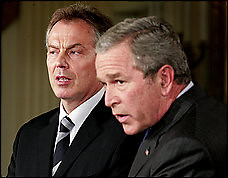The uncheckable president
Richard Nixon infamously told David Frost in a 1977 interview that, by definition, "when the president does it, that means it is not illegal." Specter, in effect, wishes to make the Nixonian theory of presidential infallibility the law of the land. In the process, he also embraces a more modern and equally extreme theory of presidential power, and that is the second alarming implication of his bill.
Specter's proposal is based on the plainly erroneous -- and truly radical -- premise that Congress has no power to regulate presidential war powers, as spelled out in Article II of the Constitution. That is the John Yoo/David Addington "president as monarch" theory that the Bush administration has been peddling to justify everything from the lawless detention of U.S. citizens to the use of torture as an interrogation tool to the president's deliberate violations of U.S. law governing eavesdropping.
Recent judicial decisions have signaled that the federal judiciary is increasingly willing to do what Congress has so glaringly failed to do in the Bush era -- that is, impose minimal limits on presidential power. The Supreme Court's recent decision in Hamdan v. Rumsfeld was hailed as a historic victory for the restoration of checks and balances. The narrow result of Hamdan was to declare illegal the Bush administration's military commissions at Guantánamo on grounds that they violated congressional law requiring that such tribunals conform to the Geneva Conventions. But the broader significance of Hamdan was that it reaffirmed the principle that the president is bound by the restrictions imposed on him by Congress, even with regard to the exercise of his war powers. In doing so, the Court rejected the radical Bush claim to unchecked presidential power in the area of national security.
Specter's bill single-handedly reverses the judicial pushback. With his proposed FISA bill, the senator takes the constitutionally guaranteed congressional power that was just reaffirmed by the Supreme Court and gives it back to the president. It was precisely this theory of unchecked presidential power that the Hamdan decision rejected as alien to the Constitution. Yet Specter's bill, at its core, endorses that theory, and Specter himself, in a Washington Post Op-Ed, justified his bill by espousing this view of unlimited presidential power. Specter argued: "The president's constitutional power either exists or does not exist, no matter what any statute may say."
Specter's justification for his bill is simply wrong as a matter of constitutional law. As Georgetown law professor Marty Lederman put it, Specter's constitutional argument is "utter malarkey" and rests on nothing more complex or noble than a "basic misunderstanding of modern separation-of-powers doctrine." Congress unquestionably has the power -- and has always had it -- to regulate the exercise of numerous presidential powers. Indeed, when Attorney General Alberto Gonzales testified before Specter's Judiciary Committee, even he told Specter that it is false to claim that Congress lacks the power to regulate or restrict "inherent constitutional powers" of the president:
GONZALES: Well, the fact that the president, again, may have inherent authority doesn't mean that Congress has no authority in a particular area. And when we look at the words of the Constitution, and there are clear grants of authority to the Congress in a time of war.
Specter may not get it -- the main debate among law bloggers recently has been whether he really doesn't get it or is just pretending. Bush's handpicked attorney general, however, does get it.
Specter's bill will give the Cheney administration more than it dared ask for. Think about that.



